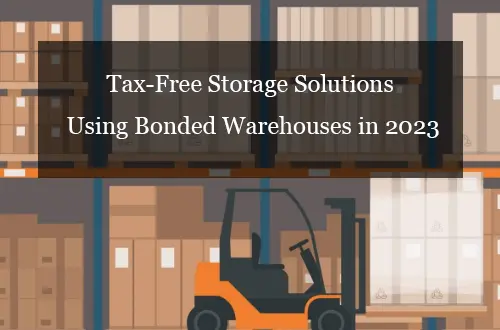Tax-Free Storage Solutions Using Bonded Warehouses in 2023
A bonded warehouse is a facility or location where imported goods can be stored, processed, or undergo manufacturing without the payment of customs duties. These warehouses are typically operated by private companies but are under the supervision and control of customs authorities.
The key features of a bonded warehouse include
Goods stored in a bonded warehouse are under the customs control of the country in which the warehouse is located. This means that the goods have not yet been cleared through customs, and duties and taxes have not been paid.
Importers can defer the payment of customs duties until the goods are removed from the bonded warehouse. Bonded warehouses may also allow for certain operations, such as testing, sampling, processing, or repackaging of goods, to be carried out within the warehouse without incurring customs duties.
There is usually a time limit for how long goods can remain in a bonded warehouse. If the goods are not removed within the specified time, customs duties may be imposed. Bonded warehouses are typically subject to strict security measures to prevent unauthorized access or removal of goods.
Bonded warehouses play a crucial role in international trade by providing flexibility for businesses in managing their inventory and cash flow. They are especially useful for businesses that import goods and need time to assess market conditions, process the goods, or engage in value-added activities before bringing them into the domestic market.
The main difference between a bonded warehouse and a non-bonded warehouse lies in the customs status of the goods stored in each type of facility.
Non-Bonded Warehouse:
Customs Cleared: Goods stored in a non-bonded warehouse have already cleared customs, and the necessary customs duties and taxes have been paid.
Immediate Availability: These warehouses are suitable for goods that are ready for distribution or sale in the domestic market immediately upon arrival. There is no need to wait for customs clearance or payment of duties.
Limited Processing: Non-bonded warehouses may have restrictions on certain processing or manufacturing activities. Generally, these warehouses are used for straightforward storage and distribution.
No Deferral of Duties: Importers must pay customs duties and taxes at the time of importation or shortly thereafter.
Not Under Customs Control: Non-bonded warehouses are not subject to the same customs control and supervision as bonded warehouses. Once goods are cleared, they are considered part of the domestic market.
Bonded warehouses provide a mechanism for deferring customs duties and taxes until the goods are ready for distribution, while non-bonded warehouses are used for goods that have already undergone customs clearance and are immediately available for the domestic market. The choice between bonded and non-bonded warehouses depends on the specific needs and strategies of the importer or business.
Since bonded warehouses are primarily used for imported products, they are usually located near ports of entry. The busier the port of entry, the more likely it is that there will be a variety of warehouses available. Bonded warehouses, whose main purpose is manufacturing with imported raw materials, are located further away from these ports.
Working with a 3PL logistics company can handle your warehousing needs and help you find the right location to meet your needs.

How much does a bonded warehouse cost ?
The cost of using a bonded warehouse can vary widely depending on several factors, including the location, size of the warehouse, services provided, and the duration for which you intend to use the facility. Here are some factors that can influence the cost of a bonded warehouse:
The cost of bonded warehouse services can vary significantly based on the geographic location. Warehouses in major cities or near ports may be more expensive than those in less central locations.
The size of the warehouse space you require will impact the cost. Larger spaces typically come with higher rental fees.
Some bonded warehouses offer additional services such as inventory management, labeling, packaging, and distribution. The more services you require, the higher the cost may be.
The length of time you plan to store goods in the bonded warehouse can affect the overall cost. Some warehouses may offer discounts for long-term storage.
Warehouses with advanced security measures and facilities may charge higher fees. This could include features such as climate control, advanced security systems, and specialized equipment.
If the bonded warehouse provides customs brokerage services, there may be additional fees for handling the customs clearance process.
It's important to note that costs can vary between different warehouse providers, and it's advisable to obtain quotes from several bonded warehouses to compare prices and services. Additionally, be sure to factor in any additional costs associated with transportation of goods to and from the warehouse.
Although the goods are stored in a bonded warehouse, the importer is not required to pay import duties. In this sense, bonded warehouses are tax-free. But bonded warehouses are not set up for retail distribution. Import tariffs have not been lifted, just postponed. Once the goods are removed and sold in the United States, import taxes must be paid.
Goods in bonded warehouses have three exemptions and can be released without paying duties.
First, export goods back to the United States
Second, for release to ships or aircraft to which items can be sold duty-free
Third, if the merchandise must be destroyed under CBP regulations
Bonded warehouses are designed to help importers keep goods safe until a buyer is found or until the imported goods are altered to make them eligible for sale. All imported products sold in the United States are subject to tariffs.
Bond requirements and regulations can vary between countries, and businesses involved in international trade should consult with local customs authorities or seek advice from customs brokers to ensure they understand and meet all necessary bonding requirements.










